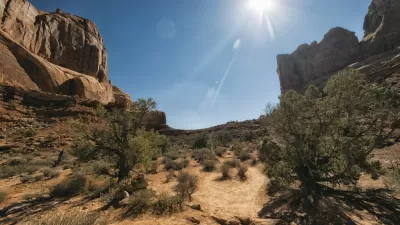Two environmental regulations enacted by the Obama Administration are expected to be rescinded under the Congressional Review Act: the Stream Protection Rule that protects water from mountaintop coal mining and limits on flaring methane emissions.
"Both are recent rules not passed by Congress, but by the executive branch under the Obama administration," states Nathan Rott for National Public Radio (transcript and audio available). "Which is important, that's why they're vulnerable now."
"The Stream Protection Rule covers waterways near surface coal mining operations like mountaintop removal mines," writes Paul Rauber for Sierra.
When the tops of mountains are blown up to get at the coal below, the resultant rubble is dumped into valleys, often leading to pollution of rivers and streams with dangerous heavy metals like selenium, mercury, and arsenic.
Some form of the rule has been around since 1983, but in late December 2016, President Obama finalized a strengthened version of the rule. It says that coal mines must not damage the “hydrologic balance” outside their permit area, and established a 100-foot buffer around streams to preserve native species. The rule also called for restoration of streams that had been damaged.
Congress will be using the Congressional Review Act to overturn this rule. Under this act, "Congress can overturn regulations issued within the last 60 legislative days with simple majority votes in both chambers," according to Countable.us. "'t would need to be signed into law by the president to take effect."
"The other [environmental regulation] limits methane flaring on public land," adds Rott.
That's when companies just burn off methane during oil and gas extraction instead of trying to capture and contain it. Industry says this is an expensive burden that hurts companies. Environmental groups say methane is one of the most powerful greenhouse gases so it needs to be curbed.
Rott goes on to elaborate on the use of the Congressional Review Act (CRA), "a rarely, rarely used legislative tool." According to Brad Plumer of Vox, the House is expected to pass legislation to rescind the Stream Protection Act using the CRA on Feb 1, along with the methane waste regulation, the Securities and Exchange Commission's resource extraction rule, and two other rules, "and will then hand things off to the Senate. Trump is expected to approve all these moves."
The five rules targeted this week may just be the beginning. Republicans could conceivably use the CRA to strike down a flurry of other final-year Obama regulations in the weeks ahead (these fuel-economy standards for trucks might be one target). Democrats don’t have the votes to stop them, and CRA votes are immune from a Senate filibuster. The only real hurdle here is how much time the GOP actually wants to spend mucking around with CRA votes, as opposed to moving on to other business, like health care or taxes.
FULL STORY: GOP Lawmakers Take Steps To Repeal Environmental Regulations

Maui's Vacation Rental Debate Turns Ugly
Verbal attacks, misinformation campaigns and fistfights plague a high-stakes debate to convert thousands of vacation rentals into long-term housing.

Planetizen Federal Action Tracker
A weekly monitor of how Trump’s orders and actions are impacting planners and planning in America.

In Urban Planning, AI Prompting Could be the New Design Thinking
Creativity has long been key to great urban design. What if we see AI as our new creative partner?

King County Supportive Housing Program Offers Hope for Unhoused Residents
The county is taking a ‘Housing First’ approach that prioritizes getting people into housing, then offering wraparound supportive services.

Researchers Use AI to Get Clearer Picture of US Housing
Analysts are using artificial intelligence to supercharge their research by allowing them to comb through data faster. Though these AI tools can be error prone, they save time and housing researchers are optimistic about the future.

Making Shared Micromobility More Inclusive
Cities and shared mobility system operators can do more to include people with disabilities in planning and operations, per a new report.
Urban Design for Planners 1: Software Tools
This six-course series explores essential urban design concepts using open source software and equips planners with the tools they need to participate fully in the urban design process.
Planning for Universal Design
Learn the tools for implementing Universal Design in planning regulations.
planning NEXT
Appalachian Highlands Housing Partners
Mpact (founded as Rail~Volution)
City of Camden Redevelopment Agency
City of Astoria
City of Portland
City of Laramie





























